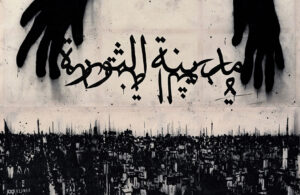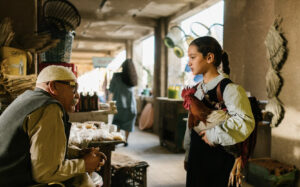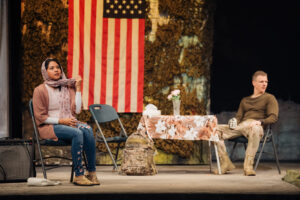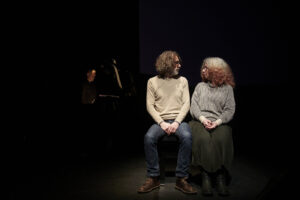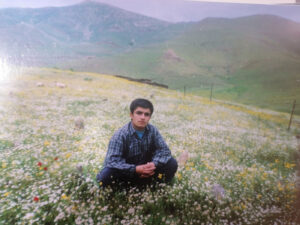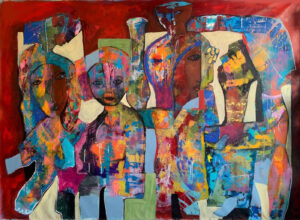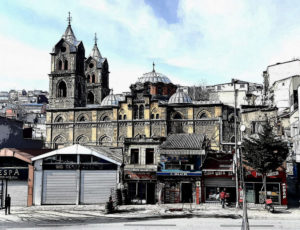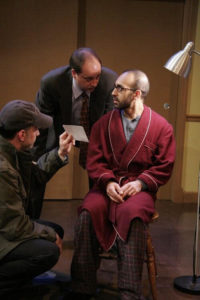
Hadani Ditmars
Have you heard the one about the Jew and the Arab who walked into a bar? No? Chances are, in these dystopian times, that no one would look up from their phones and their masks to notice, and in fact, the bar would be closed. And of course, one can simultaneously be both a Jew and an Arab. After all we are cousins and have much in common, including our funny bones.
Dark times call for dark humor, my friends. Consider these two gems:
What’s the definition of a Jewish optimist and pessimist?
Well, a pessimist says, “My God, we live in such terrible times. Things can’t get any worse than they are!” An optimist says, “Oh yes they can!”
Here’s the Gazan equivalent. An optimist says, “My God, if this situation gets any worse, with the siege, the bombings, Covid and economic disaster, soon all we’ll have left to eat is sand.” A pessimist worries that there won’t be enough sand left for everyone to eat!
Indeed so much of Jewish and Arab — this is problematic, so shall we say Ashkenazi and Levantine? Or Muslim, Jewish and Christian Arab…. but what about the Kurds and the Yezidis; okay, let’s just say Semitic and pan-Middle Eastern/former Persian and Ottoman empires… (you get the drift already) — humor is a game of spot the difference, that many have used this similarity as an opportunity for peace and understanding.
In fact, our own esteemed Jewish/Arab/Moroccan/French/American editor once hosted regular stand-up sessions in LA called the Sultans of Satire, composed of Arab, Jewish, Persian, Armenian and other assorted hyphenated Americans comprising what he called the “unruly tribes of the Middle East.”
After all, why shouldn’t our humor — the best defense/coping mechanism against racism or say looming apocalypse — bear a likeness? We’ve faced similar discrimination. Consider the racist stereotyping of Jews in the ‘30’s as both dangerous Bolsheviks and greedy bankers. Somehow the ghosts of this trope have been revisited from the late 20th century until today, with the stereotyping of Arabs and Muslims as both wild eyed “terrorists” and “greedy oil sheikhs” (rather than say, the victims of those same villains).
Then there are the comics Eman El-Husseini (who famously joked that 9/11 was her parents’ wedding anniversary) and Jess Salomon ( a lawyer turned comic with a dry sense of humor), who met at a stand-up club in Montreal and found so much common ground, they ended up marrying each other. Together the dynamic Palestinian and Jewish duo are comedy magic, highlighting both their similarities and differences and even creating a new comic book called the El-Salomons that they hope to turn into an animated sitcom.
In one cartoon, El-Husseini encounters Christian missionaries and scares them away just by describing herself: “I’m Muslim … and gay … and my wife is Jewish,” she says. “Have a nice day,” the missionaries respond.
In another, the couple discuss baby names. “If it’s a boy,” says El Husseini, “I’m thinking Yasir, Mustafa, Hammad, Ahmed…” to which her better half replies, “Are those baby names or a no-fly list?”
It’s no secret that humor — especially in the North American context — pushes the envelope politically, where politicians dare not tread. Palestinian-American comedian Emily Shihadeh really nailed the essence of the Israeli-Palestinian saga when, in her one woman show Grapes and Figs Are in Season she quipped (and I paraphrase), “What do you mean we don’t recognize Israel. Of course we do. Look over there, I recognize my grandmother’s farm, my uncle’s house!”
But I admit my tastes are rather old school. Much of my pandemic coping strategy has revolved around watching episodes of Curb Your Enthusiasm and reading stories by Mullah Nasrudin (in between singing Fanny Brice tunes) Now, while these two characters — one a Jewish American comedian and the other the legendary 13th century Seljuk satirist known as Hoja — might seem worlds apart, they too share much in common. Their whole schtick, as with the best humor, is to emphasize the very absurdity of existence, through instructive anecdotes about human foibles. Both men play the fool as a device for illumination, and Hoja’s stories — like Larry David’s improv — often meander into flights of allegorical fancy.
It comes as no surprise to learn that Hoja, like the best Sufi sages, borrowed heavily from a variety of traditions including Persian, Indian, Buddhist and yes, Jewish. There are so many examples, especially in medieval times, of Jewish mystics and Muslim Sufis influencing each other’s spiritual practices, it make sense that they would influence each other’s humor as well.
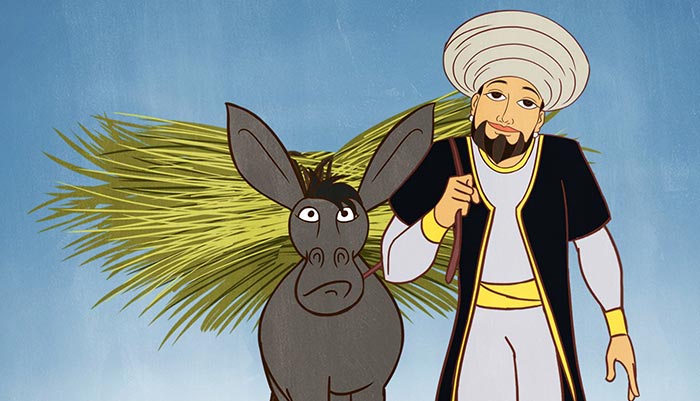
Here’s one of my favorite Hoja jokes: Nasrudin used to take his donkey across a border every day, with the baskets loaded with straw. Since he admitted to being a smuggler when he trudged home every night, the border guards searched him again and again. They searched his person, sifted the straw, steeped it in water, even burned it from time to time. Meanwhile he was becoming visibly more and more prosperous. Then he retired and went to live in another country. Here one of the customs officers met him, years later. “You can tell me now, Nasrudin,” he said. “Whatever was it that you were smuggling, when we could never catch you out?”
“Donkeys,” said Nasrudin (from Idries Shah, The Sufis, Anchor, 1971, page 67).
Intriguingly, a joke called “Border Patrol” — almost identical but for the substitution of bicycles for donkeys — can be found on the website of one Aish.com — dedicated to promoting “the wisdom of the Torah.” Hmm…could the whole Israel/Palestine issue boil down to one about stealing the best material, let alone real estate?
Who wrote it first, you might ask? In the vast world of storytelling who has the monopoly on the best jokes? Take the famous Sufi tale of Yusuf and Zuleika (the wife of Potiphar), for example, the story of the Egyptian noblewoman who forsakes her honor and riches for the love of the beautiful Hebrew dreamer — the very same Joseph who was thrown into a pit by his brothers. In the Sufi version, Yusuf and Zubaida finally marry but when Yusuf asks his wife to leave her lengthy prayers and come to bed, she replies. “ Sorry, but I’m married to God now. It was Him I loved all along — you were just a veil of the Infinite.”
So not haha funny but humorous in a Zen koan kinda gotcha way — not entirely dissimilar to the plotline of an episode of Curb Your Enthusiasm. And again, unsurprisingly, there is somewhat of a debate about whether this version of the story is Sufi or Midrash in origin. But I say, why not both?
This puts paid to the rather North American stereotype that Jews get all the best lines and Muslims and Arabs are somehow humorless — as do the Hoja jokes that are very popular in Afghanistan, a country much less celebrated for its humor than for its terrorism.
But before you insist that the Taliban have some kind of cultural monopoly, consider this gem of an Afghan tribal joke (as told to me by an Afghan woman friend): There was a pir (saintly man) who went to a village in Peshawar to ensure the building of a shrine to another pir who had died there. He was rather shocked to arrive and see that nothing had been constructed in honor of his fellow pir and kept berating the villagers, saying, “You people are godless creatures. You must build a shrine or face divine wrath.” The villagers went about their business, ignoring him and saying yes, tomorrow, tomorrow, until finally the pir really let them have it. So, the very next day, they killed him, and built a shrine.
While this kind of humor is right up there with the darkest of say Russian Jewish humor, it also demonstrates how tribal loyalties in Afghanistan trump faith. Could this be a kind of Peshawar version of Larry David’s spite store?
It’s no surprise that many of my friends from the Middle East living in diaspora enjoy the barbed humor and situational comedy of Curb Your Enthusiasm. I wonder if it’s dubbed in Arabic or Urdu? If not, there’s certainly an untapped niche market. And while US foreign policy in the region and growing Islamophobia remain huge issues, shows like Curb demonstrate how comedy can lead by example.
Larry David is a genius at exposing the hypocrisies in American society, just as Hoja did in his own way in the 13th century. Beginning with 2004’s Season 4 opener, the “Blind Date” in which Moon Unit Zappa plays Haboos, the veiled Gulf Arab who gets set up with Larry’s blind pianist friend, his exploration of American taboos is brilliant. The episode also features a subplot about mentally disabled car mechanics who steal Larry’s sunscreen. In typical Curb style, all the plot tentacles get wrapped up together when Larry ends up at a diner with his blind friend and Haboos and encounters the mechanics, who invite the trio to sit with them. Just as they do, some of Larry’s Jewish comedian friends walk in and see him sitting between a mentally disabled man and a veiled Muslim woman. The look of disdain on their faces says it all. And then in a further twist, when Larry makes his wife Cheryl don a veil to protect her modesty in a revealing I Dream of Jeannie Halloween costume, their car gets egged by Islamophobes.
And who can forget the Palestinian chicken episode, in Season 8 in 2011, when Larry is torn between loyalty to his pro-Israel friends who want to boycott a new Palestinian eatery and his love for both the delicious chicken they serve and his passion for a gorgeous Palestinian woman who hangs out there.
Then there’s Fatwa, the Musical, from Season 9 in 2017 — Larry’s inspired take on the Salman Rushdie story that earns him his own fatwa. I have to confess, this one had me wondering whether a chance encounter with David in 2012 at the Grill on the Alley was his inspiration.
So….an Arab Canadian goes out for lunch in Beverly Hills, fresh from the centenary of the Beverly Hills Hotel, dressed in a retro Hollywood outfit complete with floppy hat. Against better Canadian instincts and egged on by waitress — go on, he comes here all the time, his friend is late go and sit with him — she edges up to Larry David’s booth and says something like Hello, Mr David, I’m a fan. You’re a comic genius to which he replies with a nod and a So What’s with the hat? And henceforth I have magically entered into an episode of Curb Your Enthusiasm complete with banter, discussion of the Palestinian chicken show, and he even lets me tell — with his express permission — my one Jewish joke. (An out of work actor in Brooklyn lands a part in a Broadway play and phones his mother to share the news. That’s wonderful, she says, What’s the part. Well, he says, I play the part of the husband….silence and then, What? It’s not a speaking role?) And… he laughs!
Soon I’m telling him about my book on Iraq, Dancing in the No-Fly Zone, that has a whole chapter on Iraqi musical comedy — complete with, you guessed it, dark humor. (I have a friend who’s a coffin maker and he has a sale on this week. Half price for newlyweds!) I tell David how musical comedy was hugely popular in Iraq especially during the 12 years of the embargo when cinemas closed down due to film processing chemicals being blocked at the border by draconian UN sanctions– along with oxygen tanks and spare parts for generators and chlorine for water purification — and were converted into theatres; a time when plays ran for a whole year and people needed to laugh to escape their grim reality.
The popular musicals that criticized the regime with double meanings and veiled references to Saddam Hussein in the guise of corrupt Ottoman sultans in historical romps, were in fact remnants of a once lively cabaret scene that flourished in the Middle East — and of course found its Western connection in music hall and Yiddish theatre/cabaret.
Larry David gave me the name of his agency and asked for a copy of the book. A few days later, I drove out to the agency and gave a signed copy to the assistant of the assistant of his agent. Alas, I might have won a walk on part if only I hadn’t been foiled by the fact that I’d downsized my handbag for the sake of the outfit that day and had not a single business card to my name. Oh well, Larry, we’ll always have the Grill on the Alley.
But then, why shouldn’t we borrow from each other’s material? Why aren’t we allowed to tell each other’s jokes ? What would the Salomon-El Husseinis say?
Maybe we should tell each other’s stories. After all they’re so alike.
Larry David’s best episodes feature circular plotlines that return back on themselves, like the one about how hard it is to open packages that ends with him buying an exacto knife that — wait for it — is hermetically sealed in an impenetrable plastic package. One thinks of the famous Mullah Nasrudin story about losing his keys (Larry is always losing his).
A man is walking home late one night when he sees an anxious Mulla Nasrudin down on all fours, crawling on his hands and knees on the road, searching frantically under a streetlight for something on the ground.
“Mulla, what have you lost?” the passer-by asks.
“I am searching for the key to my house,” Nasrudin says worriedly.
“I’ll help you search for your key,” the man says and joins Mulla Nasrudin in the search. Soon both men are down on their knees under the streetlight, looking for the lost key. After some time the man asks Nasrudin:
“Tell me Mulla, do you remember where exactly you dropped the key?” Nasrudin waves his arm back toward the darkness and says, “Over there, in my house. I lost the key inside my house…”
Shocked and exasperated, the passer-by jumps up and shouts at Mulla Nasrudin,
“Then why are you searching for the key out here in the street?”
“Because there is more light here than inside my house,” Mulla Nasrudin answers nonchalantly.
May the light of humor continue to illuminate our way in these dark days, my friends, and may we all raise a glass together to the power of shared laughter.




